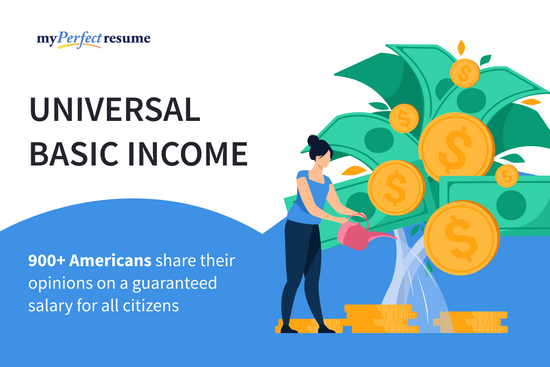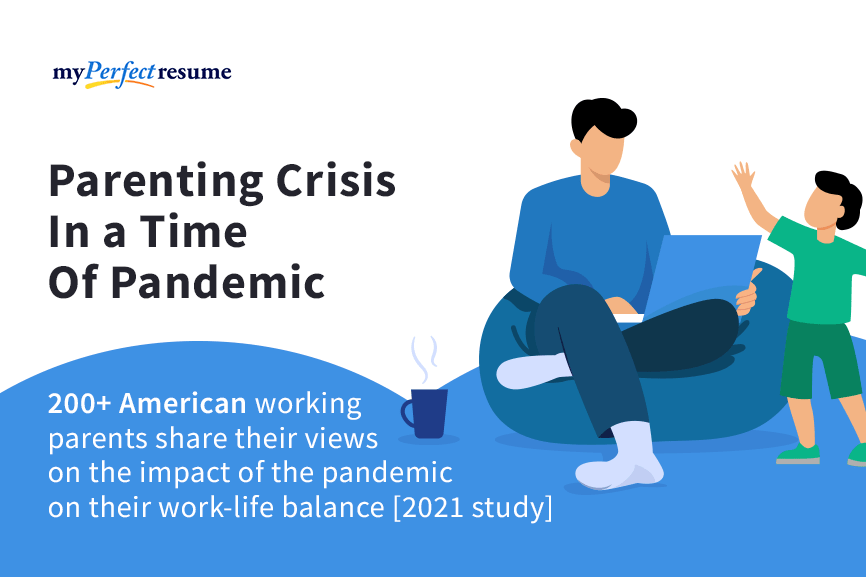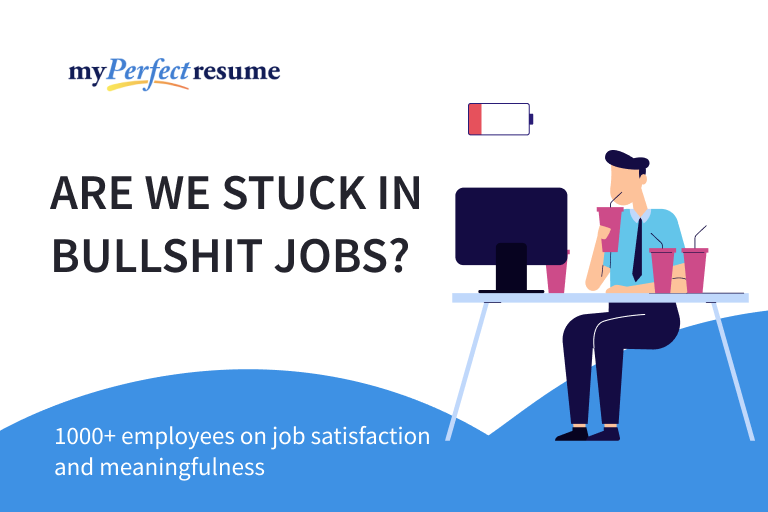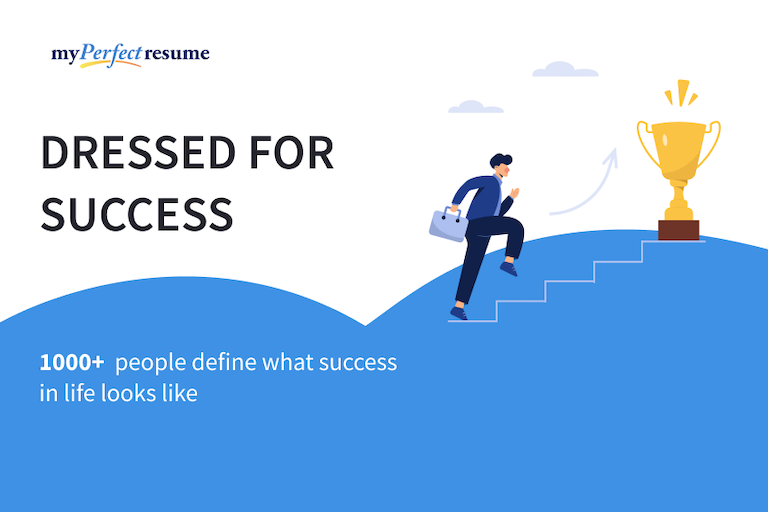Free Money: Americans Weigh In on Universal Basic Income
MyPerfectResume.com [February 10, 2023],
[https://www.myperfectresume.com/career-center/careers/basics/universal-basic-income]

Our customers have been hired at: *Foot Note
Meet Alice, a single mother of two who lost her job at a boutique hotel at the start of the pandemic.
With no income, she struggled to pay her rent and feed her kids. After a couple of months of unsuccessful job searching she was desperate and had to take the first job she was offered as a housekeeper. Even though it paid significantly less than her previous role.
Alice’s story is just one among 9.5 million other American workers who lost their jobs when the pandemic struck.
According to the U.S. Census, there were 37.2 million Americans in poverty in 2020. That was about 3.3 million more than in 2019.
With universal basic income, Alice, and those like her, could have received enough money to meet their essential needs and not have to take the first low-income job that came along. They wouldn’t have to apply for this money to prove their worthiness. They would just…
GET. THE. MONEY.
Although on the surface it sounds like a potentially life-saving benefit, universal basic income is fraught with political divisiveness.
MyPerfectResume wanted to get to the bottom of whether people from different backgrounds with vastly different political beliefs could support a Universal Basic Income.
So, we asked 900 American workers their opinions and collected jam-packed data that shows who was on board and who’d pass on universal basic income.
Although “basic” is in the name, some details need explaining.
The Basics of Universal Basic Income
How would you feel if someone handed you $1000?
No questions, no strings attached.
And you got this $1000 every month of the year… just for being a citizen.
I’d bet my bottom dollar you could think of a good use for it.
That’s the idea behind universal basic income (UBI). All citizens receive money from the government without having to apply or go through any bureaucratic red tape.
As can be seen from the infographic above, universal basic income is given to all citizens, regardless of need. Most UBI models are monthly payments, though some propose a lump sum.
The sum would vary depending on inflation. Some models propose $1000 a month.
There are two combined traits that are unique to a UBI: universality and unconditionality.
You’re thinking, “Where would these universal, unconditional payments come from?”
A couple possibilities:
- The wealthiest 1% of society
(Proposed by Facebook co-founder Chris Hughes)
- A value-added tax, or VAT, of 10% on goods and services a company produces
(Proposed by Anthony Yang, former Presidential candidate)
- Transaction fees on trades of stocks, bonds, and derivatives, and/or fees applied to patent and royalty earnings
(Model created by James Boyce, UMASS Professor of Economics and Peter Barnes, co-founder of Credo Mobile and the author of “With Liberty and Dividends for All.”)
Those are a few concepts to float a program that could cost more than $3 trillion dollars a year.
Over the last sixty years, countries around the globe have executed versions of basic income experiments, pilots, programs, and policies (including current programs in the Netherlands, Finland, and Ontario).
In the U.S., a high-profile UBI experiment in Stockton, California gave randomly selected residents $500 per month for two years, no strings attached.
This experiment showed that the payments improved participants’:
- Job prospects
- Financial stability
- Overall well-being
Not only that, it stabilized previously vulnerable households as the pandemic started.
So, those are the basics of UBI. How many respondents had heard about it?
Awareness of UBI
Most of the survey respondents had heard of a universal basic income.
- 82% said they knew what universal basic income was
There was no significant statistical difference between the political party affiliations in terms of awareness of UBI.
As can be seen in the infographic above, those with higher education levels and who made more money knew more about the program.
- Also, 85% of men said they had heard of UBI, compared to 76% of women
This is interesting because women in America are more likely to be poor than men. And a UBI could be a means of somewhat evening the playing field between men and women.
According to, “The Straight Facts on Women in Poverty:”
“Women are poorer than men in all racial and ethnic groups.”
It was important to provide all the survey takers with knowledge about UBI. As part of the survey, the participants read information about what it is and how it works, including the pros and cons of a UBI.
Opinions on a UBI
In August 2020, The Pew Research Center reported that, “More Americans oppose than favor the government providing a universal basic income for all adult citizens.”
According to their study:
Our study, conducted on 907 American workers, showed greater support for a UBI. And respondents with lower incomes showed higher levels of support for a UBI.
But by far, the most impressive statistical differences were visible from the political affiliation angle.
We gave respondents a series of statements and asked how much they agreed or disagreed with one. For each statement, those who identified as Democrats showed the greatest support for UBI.
But, a majority of all three political affiliations identified in the study: Republican, Democrat, and Independent were in favor of UBI.
For example, when asked how much they agree or disagree with this statement:
“UBI could help address income inequalities between men and women,”
58% of Republican-leaning respondents agreed. Not what you might expect.
But the Republican belief in the sovereignty of the people makes a case for people having more control with greater financial support.
“The premises [republicanism] invokes are inherently and independently persuasive, deriving from a well-established conception of freedom as non-domination. And, absent problems of feasibility, they give us plausible grounds for arguing in favor of a dispensation in which people enjoy a universal right to a basic income.”
—"A Republican Right to Basic Income?"
For the statement about addressing gender inequalities, just 2% of Democratic-leaning strongly disagreed, vs. 9% of Republican-leaning and 13% of Independent-leaning.
Men agreed a bit more than women.
- 65% of men agreed
- 58% of women agreed
It was a bit unexpected that more men than women would see a UBI as a way to improve gender inequality. Perhaps they’ve become more sensitive to the unequal pay message we’ve heard over the years.
One of the main arguments against UBI is that it could make people lazy. They won’t want to work if they’re getting paid to do nothing.
To address this, the respondents were asked how much they agreed or disagreed with the following statement:
“UBI could make people not want to work if they’re getting paid and not employed.”
As can be seen from the infographic above, Republican-leaning survey takers agreed the most at 73%
“I think there’s a certain dignity from work. Some of my younger students say, ‘Oh, there could be a lot of dignity from meditation and from other ways of spending time.’ But I think for most people there will be a real desire to work.”
—Nobel laureate in economics Joseph Stiglitz
One of the main arguments for a UBI is that automation and AI are taking over many jobs in the States.
As many as half of our current occupations will vanish in the face of computerization, a recent Oxford University study argued. In this scenario, a UBI could help people adjust to the disappearance of large swaths of current job positions in the second machine age.
So we asked how much they agreed or disagreed with this statement:
“With advanced technology/automation/AI taking over more and more jobs, a UBI would act as a security net for the people who’ll lose their jobs”
- 73% of Democratic-leaning agreed
- 65% of Republican-leaning agreed
- 61% of Independent-leaning agreed
“We are in the fourth inning of automation. Four million manufacturing jobs have been taken since 2000 and automated trucks are already making deliveries in Colorado. One out of 10 American workers works in retail. If we wait any longer, we will be out of time.”
― Andrew Yang, former Presidential candidate, who made UBI the foundation of his 2020 campaign platform.
Some argue that a UBI could empower domestic violence victims with the financial freedom to leave abusive partners. So we asked our respondents their opinion about the following statement:
“A UBI could make leaving an abusive partner easier from a financial point of view.”
A huge majority of Democratic-leaning survey takers agreed at 76%. But, Republican-leaning were also mostly in agreement at 67% and Independent-leaning at 63%.
Women and men agreed equally to this.
In terms of yearly salary, those who made the least agreed the most:
- Less than $25,000—75%
- $25-49,999—72%
- $50-74,999—70%
- $75,000 or more—67%
Next, we explored the idea that nixing social programs, such as welfare and replacing it with a UBI is a potential con.
“Sacrificing all social programs (like welfare) for the sake of a UBI is a terrible idea.”
Those with the highest salary agreed the most with this statement.
- $75,000 or more—62%
- $50-74,999—59%
- $25-49,999—49%
- Less than $25,000—47%
It’s clear that those who are disadvantaged and who might actually be using social support would prefer a UBI. Welfare has “worthiness” at its core. You have to prove your situation warrants the aid.
Most social welfare requires participants to show that they need the aid. Sometimes it is difficult to prove and there is a lot of bureaucracy to contend with. The idea of whether someone is “deserving” is central to social programs.
“The idea of an unconditional income, paid to all irrespective of means, contradicts many people’s notions of deservingness, and who should get what and why.”
—"The Case Against Universal Basic Income"
On the positive side, some say that a UBI could help enable more volunteer work. People would have greater financial freedom to spend their time helping others. Did our respondents agree? Here’s the statement we gave them:
“A UBI could help communities because those who aren’t scrambling to find a source of income would have more time to volunteer.”
The older group was more likely to disagree with this statement.
- Age 38 and under—9% disagreed
- Age 39 and above—20% disagreed
A strong majority of Democratic-leaning respondents agreed, 67%, but most Republicans did too, 58%. Independent-leaning respondents were less enthusiastic though, less than half agreed, 49%.
As in the case of Alice at the start of this piece, many people who are desperate for work are forced to take jobs they don’t like. Proponents of a UBI argue that it would allow unemployed people to wait it out and find a more suitable job.
“Making an economy more productive...in a sustainable fashion is not best served by obsessively activating people and locking them up in jobs that they hate doing and from which they learn nothing.”
― Philippe van Parijs, “Basic Income: A Radical Proposal for a Free Society and a Sane Economy”
Here’s the statement we tested with our respondents:
“UBI could help people to get jobs they actually want, as they don’t have to rush into accepting a job they don’t like when they’re unemployed.”
- 18% of those age 38 and younger disagreed
- 14% of those 39 and older disagreed
In regard to political affiliation:
- 67% of Democratic-leaning agreed
- 58% of Republican-leaning agreed
- 55% of Independent-leaning agreed
Regarding personal income level:
- 33% of those who made $25,000 and under strongly agreed
- 29% of those who made $25,000-$49,999 strongly agreed
- 25% of those who made $75,000 or more strongly agreed
- 16% of those who made $50,000-$74,999 strongly agreed
“The most important reason for the acceptance of the concept is that it might drastically enhance the freedom of the individual.”
―Erich Fromm
(In 1955, Erich Fromm wrote a book called “Ways Out of a Sick Society”. Universal and unconditional basic income was one of those ways.)
The bottom line is whether UBI would be voted for if it came down to it.
Would You Vote “YES” to UBI?
Now that the survey takers had learned the specifics of universal basic income and had a chance to express their opinions, they were primed to “go to the primaries.”
As you can see from the infographic above, Democrats were hugely in favor of a UBI.
We asked: Would you vote “YES” to UBI?
- Overall, 80% said they would vote “YES”
- Democrat-leaning—85%
- Independent-leaning—78%
- Republican-leaning—72%
Men were more in favor than women: 83% would vote yes, vs. 76% of women.
Surprisingly, those whose incomes were between $50,000-$75,000 were more in favor—88%—than those who made less than $25,000—77%.
In terms of geographical location, those who live in the West said they’d vote “YES” the most
- West: 86%
- Northeast: 82%
- Midwest: 78%
- Southeast: 76%
- Southwest: 73%
The bottom line: the majority would vote “YES.”
It was important to give the survey takers a concrete, American example of a UBI in action that they could sink their teeth into, in order to know if it really can work. The best example of this is…
The Alaska Permanent Fund
“Welcome to Alaska. Here’s a thousand dollars.”
—“Toll Booth Man” to Homer Simpson
Before you book your flight to the state known as the “Land of the Midnight Sun,” you won’t actually be handed a thousand Big Ones just driving through a toll, like in The Simpsons.
But, Alaska is an interesting state to visit or live in.
Fun facts about Alaska:
- Largest U.S. state
- No state tax
- Cheap and fresh seafood
- Capital: Juneau
- Large oil industry
- Moose’s Tooth Pizza (rated #3 in the country)
- Monthly dividend paid to all residents
This monthly dividend is called the Alaska Permanent Fund. It was established in Alaska in 1976 by Governor Jay Hammond and Attorney General Avrum Gross.
According to the Alaska Permanent Fund website:
“Our mission is to administer the permanent fund dividend program assuring that all eligible Alaskans receive timely dividends, fraud is prosecuted, and all internal and external stakeholders are treated with respect.”
—Anna MacKinnon, Division Director
Key Points:
- The Alaska Permanent Fund comes from surplus revenue obtained from Alaska's oil and gas reserves
- Payouts go to every citizen of Alaska who has a one-year or more residency (those who’ve been convicted of state felonies, are incarcerated, or are convicted of specific misdemeanors are not eligible)
- This year’s dividend: $1,114
So, yeah, you have to establish residency to receive this monthly dividend.
Apparently, the state known as the “Last Frontier” has a “people first” mentality.
To come back to Homer Simpson:
“We have a great life here in Alaska, and we’re never going back to America again!”
We provided those American workers in the study with information about the Alaska Permanent Fund to see their opinions on this benefit.
Opinions on the Alaska Permanent Fund
All survey takers were given details on the Alaska Permanent Fund (APF) and asked what their opinion was on it. Their options were: positive, neutral, and negative.
The overall result:
- 63%—“positive”
- 32%—“neutral”
- 5%—“negative”
The younger age group (under 39) were more positive about it: 70%, compared to 58% of those 39 and over.
Women and men were nearly identical in their opinion: 63% positive for men and 64% positive for women.
Those whose incomes were highest at $75,000 or more had the least “positivity” about the APF at 57%. For all other income groups the level of positivity was very similar, scoring 64–65%.
And last, but certainly not least, the political affiliation filter was set.
- Democrat-leaning: 66% positive, 3% negative
- Republican-leaning: 64% positive, 7% negative
- Independent-leaning: 56% positive, 8% negative
We wanted to revisit the “would you vote ‘YES’” question to see if the APF information would have any impact on their opinions.
Would You Vote “YES” to UBI? (Redux)
But—we reworded the question to make it more state-specific:
“If your state wanted to try UBI would you support it?”
“YES”
- Democrat-leaning—87%
- Independent-leaning—80%
- Republican-leaning—76%
Let’s rewind to the earlier question: “Would you vote “YES” to a UBI?” This question was posed before they had knowledge of the APF.
Percentages prior to learning about APF:
- Democrat-leaning—85%
- Independent-leaning—78%
- Republican-leaning—72%
It seems knowledge is influential, as all percentages increased.
Opinions are more than just numbers, so let’s hear from the respondents themselves.
In Their Own Words
We wanted to give the respondents an opportunity to voice their opinions, so we gave them the floor.
Here are some examples of their opinions on a UBI:
“It should already be implemented and capped at certain income levels. It should still be viewed as a supplement to other income but provide at least a minimum that helps the cost of living. Inflation and other negative concerns can and should be solved by new economic policies, less hoarding of wealth from corporations, and high-income individuals/families.”
“Implementing UBI is just a Band-Aid to a growing epidemic of laziness and poor work ethic in this country. It is not going to give people in need financial freedom or opportunity; it is just going to be a crutch for them that they will squander.”
“I believe it would make people lazy. We see this already with the extra unemployment that people have received from the COVID stimuli. We have people making more money by sitting at home and they are doing it.”
“It would help retired people trying to live on Social Security income.”
“I think this is an amazing solution to resolving a lot of the issues in the United States. Programs have been decreasing over time anyway, this might help catch the people who need support and are not getting it.”
It was clear the respondents had thought deeply about this issue and had something valuable to share.
In Conclusion
The results of the survey show that most people, regardless of political affiliation, age, sex, and geographical location, agree with the idea of universal basic income.
Perhaps the pandemic reignited a bygone idea. The original idea of a universal income is quite old.
Although arguments are strong on both sides, most of the American workers surveyed are in favor of a universal and unconditional basic income.
Perhaps its time has come.
Methodology
We surveyed 907 respondents online via a bespoke polling tool on their thoughts and opinions on universal basic income. All respondents included in the study passed an attention-check question. The study was created through several steps of research, crowdsourcing, and surveying.
Limitations
The data we are presenting relies on self-reports from respondents. Each person who took our survey read and responded to each question without any research administration or interference. There are many potential issues with self-reported data like selective memory, telescoping, attribution, or exaggeration.
Some questions and responses have been rephrased or condensed for clarity and ease of understanding for readers. In some cases, the percentages presented may not add up to 100 percent; depending on the case, this can be due to rounding, or due to being part of a larger statistic, or due to responses of “neither/uncertain/unknown” not being presented.
Fair Use Statement
Don't miss the chance to share these findings—–you might regret it! If you think your audience will be interested in this information, you can share it for noncommercial reuse. All we ask in return is that you link back to this page so that your readers can view the full study.
About Us
At MyPerfectResume, we believe in empowering individuals about all aspects of the evolving job market, including discussions about universal income. Our extensive collection of resume examples, wide-assortment of professional resume templates, and user-friendly online resume builder equips you with the tools to showcase your skills and experience, enabling you to navigate career transitions and seize new opportunities. Explore our resources and create a standout resume to shape your professional future.
How we reviewed this article
Since 2012, we have helped more than 11 million job seekers with our user-friendly tools and career advice articles. We have a rigorous editorial process to ensure that our content is helpful and accurate. Explore our recent employment studies and press coverage, and discover why our certified career experts are a trusted source for professionals worldwide.
Sources
- Benedikt, C., Osborne, M., “The Future of Employment: How Susceptible are Jobs to Computerisation?”
- Francese, M., Prady, D., “What is Universal Basic Income?”
- Giberstadt, H. “More Americans oppose than favor the government providing a universal basic income for all adult citizens”
- Hasler, A., Lusardi, A. The Gender Gap in Financial Literacy: A Global Perspective”
- King, J.E., Marangos, J. “Two Arguments for Basic Income: Thomas Paine and Thomas Spence”
- Nettle, D., Johnson, E., Saxe, R., “Why has the COVID-19 pandemic increased support for Universal Basic Income?
- Pettit, P., “A Republican Right to Basic Income?”
- Sage, D., Diamond P., “The Case Against Universal Basic Income.”
- The Economist, “Basically Unaffordable”
- World Bank Group, “Exploring Universal Basic Income: A Guide to Navigating Concepts, Evidence, and Practices”
Our customers have been hired at:*Foot Note













